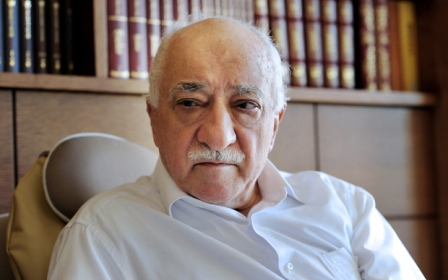Turkey releases hacked message implicating Gulen followers in coup

ISTANBUL, Turkey – A message, posted on an encrypted messaging system and allegedly showing two followers of Fethullah Gulen discussing how to deal with the post-coup crackdown, was released on Saturday.
A Turkish official, who wished to remain anonymous, released the message to the press and said that the conversation was pulled from a messaging application called Eagle.
Turkish authorities hold Gulen, a Turkish preacher now based in the US, and his followers responsible for the coup attempt of 15 July.
The message sent by user 60304 to user 76970 on 30 July appears to show one person explaining how to avoid revealing any role in the attempted coup during questioning, and contains tips on what to say in response to potential questions about giving a monetary tribute to the Gulen movement.
Part of the message reads: “For instance, the answer to the question whether you pay himmet [tribute], it must be said that one does not make any donations except what Diyanet [the state-run religious affairs directorate] collects in return for a [official] receipt.”
Another part of the message reads: “In response to questions about the coup attempt, one must demonstrate a democratic attitude and make it clear that one was neither directly nor indirectly supportive of the coup. If the opposite party cannot prove it, a tweet about the coup or something that was said must be absolutely denied.”
According to officials, Turkish intelligence began tracking Gulen-linked users and decrypting their messages on the Bylock encrypted messaging service in early 2016.
When they found out they were at risk, the Gulen followers involved switched to the Eagle messaging system, which is more secure. Authorities allege that the network is still using the system.
A total of 150,000 Bylock users are being implicated as being part of the Gulenist network. Of these, 56,000 have been identified and are said to be in Turkey.
The locations of the other 94,000 remain unknown.
The Turkish official said that the decrypted messages thus far are not directly related to the coup attempt, but said work on decrypting the Eagle messaging was still at an early stage.
The scale and speed of the post-coup crackdown has caused concern, primarily in the West, that it will turn into a purge of President Recep Tayyip Erdogan and his Justice and Development Party’s opponents.
Meanwhile, Erdogan said on Saturday that the coup attempt was far from over and that the authorities will remain alert.
“Greater powers [a term he uses to refer to unknown forces] are playing a ruthless game. I don’t think this affair [coup attempt] is over. We will not let lethargy set in,” Erdogan told Turkish media representatives, according to the Hurriyet newspaper.
Ankara has also lashed out at the West, particularly America, claiming it supports the plotters and has warned Washington that relations will suffer if it fails to extradite Gulen. An Istanbul court issued an arrest warrant for Gulen on 4 August for ordering the failed coup.
Erdogan has accused Washington of sheltering the preacher and called the failed action a "scenario written from outside," in an allusion to foreign intervention.
Washington has repeatedly dismissed the allegations. On Saturday, the United States' ambassador to Turkey, John Bass, said he was deeply disturbed and offended by the accusations targeting his country.
"I just want to say again, as I've said before and as we've said from Washington, the United States government did not plan, direct, support or have any advance knowledge of any of the illegal activities that occurred the night of 15 July and into 16 July. Full stop," Bass said in remarks published in English daily Hurriyet Daily News.
Thousands of people from both the public and private sector have been detained, suspended or dismissed from their jobs since the crackdown commenced.
Officials say these steps are the result of years of meticulous investigations into people with links to the Gulen movement.
Officials also stress that Gulen elements that have infiltrated every aspect of the state system in Turkey must be uprooted completely to prevent the likelihood of the recurrence of events like that of 15 July.
Independent research carried out on the Bylock messaging application by the Reuters news agency last week revealed that it was an amateurish encryption system that could be hacked easily, since the data it sent to its servers was unencrypted.
Middle East Eye propose une couverture et une analyse indépendantes et incomparables du Moyen-Orient, de l’Afrique du Nord et d’autres régions du monde. Pour en savoir plus sur la reprise de ce contenu et les frais qui s’appliquent, veuillez remplir ce formulaire [en anglais]. Pour en savoir plus sur MEE, cliquez ici [en anglais].




